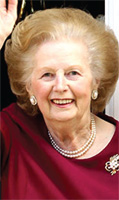
Margaret Thatcher’s political career has been one of the most remarkable of modern times. Born in October 1925 at Grantham, a small market town in eastern England, she rose to become the first (and for two decades the only) woman to lead a major Western democracy. She won three successive General Elections and served as British Prime Minister for more than eleven years (1979-90), a record unmatched in the twentieth century.
During her term of office she reshaped almost every aspect of British politics, reviving the economy, reforming outdated institutions, and reinvigorating the nation’s foreign policy. She challenged and did much to overturn the psychology of decline which had become rooted in Britain since the Second World War, pursuing national recovery with striking energy and determination.
In the process, Margaret Thatcher became one of the founders, with Ronald Reagan, of a school of conservative conviction politics, which has had a powerful and enduring impact on politics in Britain and the United States and earned her a higher international profile than any British politician since Winston Churchill.
By successfully shifting British economic and foreign policy to the right, her governments helped to encourage wider international trends which broadened and deepened during the 1980s and 1990s, as the end of the Cold War, the spread of democracy, and the growth of free markets strengthened political and economic freedom in every continent. Margaret Thatcher became one of the world’s most influential and respected political leaders, as well as one of the most controversial, dynamic, and plain-spoken, a reference point for friends and enemies alike.
After 1990 Lady Thatcher (as she became) remained a potent political figure. She wrote two best-selling volumes of memoirs – The Downing Street Years (1993) and The Path to Power (1995) – while continuing for a full decade to tour the world as a lecturer. A book of reflections on international politics – Statecraft – was published in 2002. During the period she made some important interventions in domestic British politics, notably over Bosnia and the Maastricht Treaty. In March 2002, following several small strokes, she announced an end to her career in public speaking. Denis Thatcher, her husband of more than fifty years, died in June 2003, receiving warm tributes from all sides. Margaret Thatcher remains an intensely controversial figure in Britain.
Critics claim that her economic policies were divisive socially, that she was harsh or ‘uncaring’ in her politics, and hostile to the institutions of the British welfare state. Defenders point to a transformation in Britain’s economic performance over the course of the Thatcher Governments and those of her successors as Prime Minister. Trade union reforms, privatization, deregulation, a strong anti-inflationary stance, and control of tax and spending have created better economic prospects for Britain than seemed possible when she became Prime Minister in 1979.
Her legacy remains the core of modern British politics: the world economic crisis since 2008 has revived many of the arguments of the 1980s, keeping her name at the centre of political debate in Britain. In her death on April 8, the world has lost a statesman.





Be the first to comment